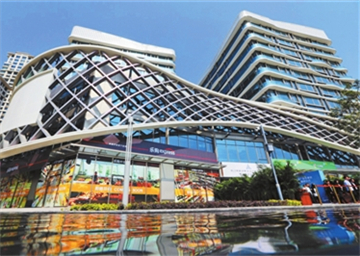Gaolan Port now famous for tender, nutritious prawns
The Gaolan Port Economic Zone was named Hometown of the Giant Tiger Prawn (Penaeus Monodon) on Oct 16 due to the crustacean's high-quality, advantageous breeding site, and distinctive industrial development propelled by science and technology.
Gaolan has a complete industrial system for the giant tiger prawn, which is also known as Asian tiger shrimp, or black tiger shrimp. Penaeus monodon is bred in an area of 10,125 mu (675 hectares, 1,668 acres) and annually yields 4,773 tons, accounting for 7.6 percent of Guangdong's total production and 5.7 percent of the national supply. The output value reached 300 million yuan ($45 million) last year, according to Zhuhai's fishery statistics report.

Penaeus monodon [Photo by Zhang Zhou / Zhujiang Evening Post]
China Aquatic Products Processing & Marketing Alliance experts approved the application from the Gaolan Port Economic Zone Marine & Agricultural Bureau and Zhuhai Modern Agriculture Development Center after two days of field investigation, material review, debriefing, inquires, and discussion.
The prawn is rich in nutrition and has tender meat that is easy to digest. It is noted for nourishing the stomach, kidney, and intestines. The Gaolan area breeds improved species, breaks bottlenecks, and promotes scientific technologies in cooperation with aquatic research institutes and colleges. The South China Sea No 1 & 2 varieties have strong adaptability, fast growth, high survival rate, and a current annual yield of 350 to 500 kg per mu (2,121 to 3,030 kg per acre).
Gaolan has a wide variety of other marine species such as South American white shrimp, sea bass, lates calcarifer, mullet, yellow-fin seabream, scylla serrata, oysters, and mussels. The entire aquatic breeding area was 1,708 hectares (4,221 acres) in 2019.
The zone has 18 islands across a sea area of 1,983 sqkm (766 sq miles). Its abundance in salt and freshwater resources, and flat sea substrates provide an ideal habitat for the reproduction, growth, forage, and migration of aquatic organisms, according to Huang Fei, director of the Gaolan Port Economic Zone Marine & Agricultural Bureau.



